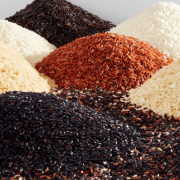Athlete Certain Gluten-Free Diet Landed Gold Performance – Experts Not So Sure
British sportstar Greg Rutherford feels certain that his switch to a gluten-free diet allowed him to leap to victory in the long jump at the World Championships in Beijing last week. This outspoken athlete’s win made him only the fifth Briton to hold simultaneous Olympic, World, European and Commonwealth titles in a single discipline. (Excerpted from article by Roz Lewis in The Express
Although the 28-year-old is now in peak physical shape he has been dogged by a dodgy tummy since his teenage years. And it has only been over the past five years that he has been tweaking his diet to reduce his symptoms.
“I am not coeliac but I used to suffer from irritable bowel syndrome (IBS) when I was in my early teens,” explains Greg. “I remember my mum taking me to the doctor with stomach pain back then so it must have been bad. I also remember in my teenage years never being as skinny or as lean as I would have liked. I was always the slightly fat kid which used to bother me quite a bit.”Greg won his first major long jump competition, the AAA Championships in 2005, aged 18. As his career progressed his focus on nutrition naturally increased. “It was when my American coach Dan Pfaff came over from the States in 2009 and started working with me that we really began to look at my diet. “He decided I was eating too many carbohydrates so I cut back on bread. Over the next year I lost weight and became leaner. Then when we reintroduced carbs back into my diet Dan advised me to go for gluten-free foods and I really noticed a difference.”
“Before then, if I had a sandwich or a bowl of pasta, I would get bloating occasionally. By switching to gluten-free foods, that lessened considerably. The type of IBS I am prone to is the constipation type where I get trapped wind and can get sharp painful spasms in my intestines as well as having sluggish bowels. I am glad it isn’t the diarrhoea type which seems much worse. The IBS is still an issue even now as I get a sensitive stomach and can suffer from acidity problems, even burping before events. If I do eat something with gluten in it I will probably feel it the next day.”
Some experts feel that going gluten free may not enhance athletic performances
by Lisa Rapaport in Reuters. Source: Medicine and Science in Sports and Exercise, online May 12, 2015.
Going gluten-free may not do anything to improve athletic performance, a small study of cyclists suggests. Eliminating grains like wheat and rye that contain the protein gluten has become a trendy extension of popular carb-cutting diets. A growing number of athletes are jumping on the bandwagon because they believe it may improve endurance and stamina.
But when Australian researchers put a group of elite cyclists on a gluten-free diet for one week, their performance was no better than it was during a week of eating foods containing wheat, the study found. “There is no evidence to suggest that gluten removal itself is linked to improved health or performance outcomes,” lead study author Dana Lis, a health sciences researcher at the University of Tasmania, said by email.

Lis and colleagues studied the gluten-free diet in 13 athletes who didn’t have celiac disease, a digestive disorder that damages the small intestine and interferes with absorption of nutrients when people eat foods containing gluten. Because athletes in the study didn’t have celiac disease, a medical reason to eliminate gluten, it’s not surprising that a diet free of this protein had no benefit, Lis said.
Researchers gave the athletes gluten-free meals during the study, and then tested their reaction to the protein by supplementing one week of meals with protein bars containing wheat or another source of gluten. Each day, the athletes completed questionnaires about their digestive health. Over the course of the study, symptoms didn’t vary based on the type of diet they followed. The cyclists also did exercise tests at the end of each week-long diet, and there was no difference in their performance based on whether or not they consumed gluten, the researchers report in the journal Medicine and Science in Sports and Exercise.
Blood tests done at the end of each diet also failed to detect a difference in inflammation based on what the cyclists ate. Eliminating gluten can relieve inflammatory bowel disorder for people with that condition, but none of the athletes included in the study had it.
If athletes are indeed gluten intolerant, which is rare, they would benefit from a gluten-free diet, said Nancy Clark, a sports nutritionist in private practice in Boston. In that small subset of people, cutting out gluten can curb inflammation, ease digestive symptoms and potentially boost performance, said Clark, who wasn’t involved in the study.
But a gluten-free diet should be the exception, not the rule, she said. “A lot of these athletes are eating this diet for no reason, limiting their intake of foods, and a lot of gluten-free packaged foods are really trashy so it’s actually a step in the wrong direction,” Clark said.
It’s possible some athletes perceive a benefit because when they go gluten-free, they also become more conscious of what they eat, consuming more fruits and vegetables and avoiding processed foods, Lis said. It’s the generally healthier diet, though, not the absence of gluten, that makes them feel better. Because the current study is small and limited to cyclists, it’s hard to say for sure without larger trials whether the impact of gluten would be similar for other athletes or people who don’t play sports, said Dr. Robert Dimeff, past president of the American Medical Society for Sports Medicine and an athletic health researcher at the University of Texas Southwestern Medical Center in Dallas.
“This is just another fad diet that science doesn’t support at this time, especially when it comes to athletic performance,” said Dimeff, who wasn’t involved in the new study. “The take home message at this time, whether you’re an athlete or not, is eat whole natural foods and don’t worry about gluten unless you are actually gluten-intolerant.”














